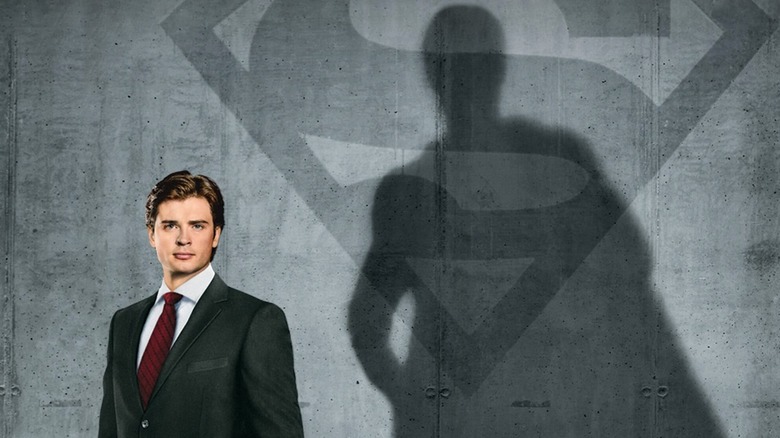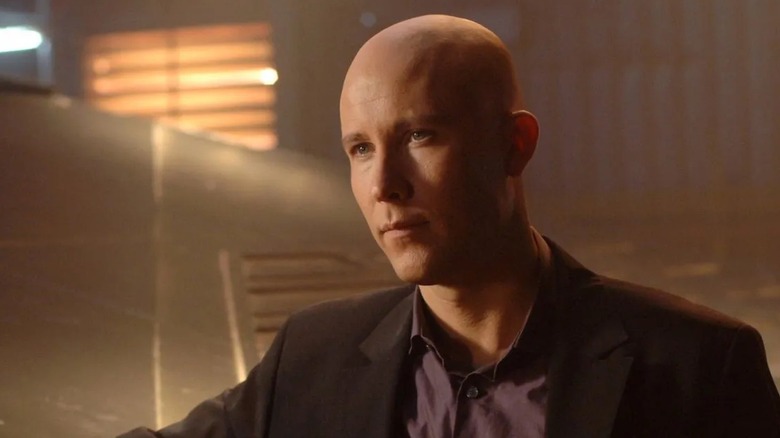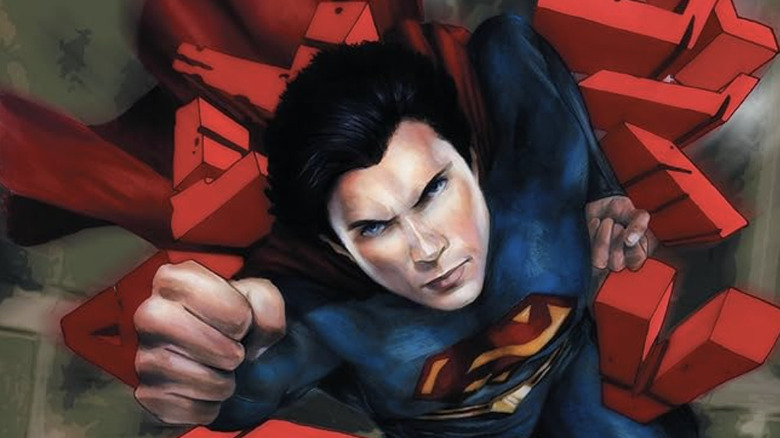Why The CW Canceled Smallville - And How It Returned
When your favorite TV show ends, you can feel like mourning. Sometimes, though, a show has gone on for so long that there's nothing left for it to do except to end. That was where "Smallville" was in 2011, when it began its 10th and final season on the CW.
"Smallville" followed a young Clark Kent (Tom Welling) during his high school years. Running storylines included Clark's relationship with girl next door Lana Lang (Kristin Kreuk) and his friendship with future nemesis, Lex Luthor (Michael Rosenbaum). Along the way, the show included a monster of the week formula where Clark battled people given superpowers from Kryptonite — "Smallville" was very consciously "Superboy" by way of "Buffy The Vampire Slayer."
Season 10 was not announced to be the final season at the time, but the writers approached it as such. (The finale of "Smallville" is literally titled "Finale.") For one, while "Smallville" wasn't failing, the show didn't have the ratings or cultural clout that it had at its early peak. The "Smallville" season 2 premiere got over 8 million viewers, whereas season 9 opened with about 2.5 million viewers. During season 9, the show even got moved to the Friday night "death slot."
Second, there was no more story to tell. Across the ups-and-downs of the "Smallville" seasons, the show became less of a Superman prequel and just a flat-out Superman show. By the end of "Smallville," Clark had:
-
Met and fallen in love with Lois Lane (Erica Durance)
-
Seen his father Jonathan Kent (John Schneider) die
-
Become archenemies with Lex Luthor (who'd also been elected President)
-
Joined the Justice League
-
Fought Brainiac, General Zod, Doomsday, and finally in season 10, Darkseid.
What else was there to do? You don't bring in the literal God of Evil as your season's big bad unless you know there's nowhere else to go. Just as "Buffy" ended with Sarah Michelle Gellar's heroine defeating "The First Evil," "Smallville" concluded with Clark finally becoming Superman and defeating Darkseid.
Smallville lasted longer than anyone expected
By "Smallville" season 6, the show had outlasted its original network, the WB. The CW was created from a merger between WB and the UPN, so that's where the final half of "Smallville" aired. Then, after season 7, Rosenbaum, Kreuk and series creators Alfred Gough and Miles Millar departed the series. (The final three seasons saw previous writing teams, Todd Slavkin & Darren Swimmer and then Kelly Souders & Brian Petersen promoted to showrunners.)
In a 2021 oral history of "Smallville" at the Hollywood Reporter, all four said they felt it was time to move on. Gough recounted:
"[Millar and I] had done seven seasons of the show. They [the network] wanted to keep going sort of indefinitely. We knew it was going to go further than season 8. We had told the stories that we wanted to tell. The show would keep going. We had trained all the people who were there that went on to run it. 'OK, we think the best thing for us and for the show is for us to step aside and let someone else do it.'"
Rosenbaum said: "I didn't leave the show. I had a six-year contract and I ended up doing seven years. And so I felt like I had done enough and the character [of Lex] had done enough." Kreuk also added that she had started "Smallville" when she was 18 and, when she left, she was 26. "['Smallville'] had been my entire young adult life. I didn't know what the stories for Lana would be in the future. I didn't want to live in a love triangle forever. I hate playing love triangles, and I just wanted to explore other aspects of my life," Kreuk said.
For their part, Gough and Millar have admitted they probably dragged the Clark/Lana story on for too long, which itself could be a symptom of the show lasting longer than they had expected. On an episode of Rosenbaum's "Inside Of You" podcast featuring Gough and Millar, the three of them all reiterated that by "Smallville" season 7, they were burnt out. Then, at the beginning of "Smallville" season 10, the entire original cast besides Tom Welling himself had left. (Allison Mack, who played Clark's friend/Lois' cousin Chloe Sullivan, stayed on in a reduced recurring role during the final season.)
Despite Gough and Millar's departure, "Finale" wrapped up the show the way they'd planned too. In a 2011 interview with Collider a few months before "Smallville" ended, Millar said: "The last moment of the show would be [Clark] putting on the [Superman] suit and flying off into his future and his destiny. That was always in our heads. That would be the ultimate end to the show."
True enough, "Finale" ends with Clark ripping off his shirt, Christopher Reeve style, to reveal the Superman suit underneath and then flying off to help people in need.
Smallville got a season 11 - just not on TV
During their appearance on "Inside of You," Gough and Millar made it clear there was zero bitterness about their "Smallville" exit. In fact, they thought they were leaving the show in the right hands. Gough said:
"We trained people, they were chomping at the bit to get into the driver's seat and ... the thing is, television is a team sport. If you're on a long-running show, at a certain point, step aside and let people that have new ideas or energy and enthusiasm take the baton and keep going."
After "Smallville" season 10 ended, series writer Bryan Q. Miller thought the story still had juice for more. So, in 2012, he took that baton and made "Smallville" season 11 — but as a comic book. Without budget limitations on effects or costumes, season 11 got wilder than the television show ever could. For one, the second arc of "Smallville" season 11 ("Detective") finally introduced Batman, who Warner Bros. never let on the show despite Tom Welling wanting his Clark Kent to meet Bruce Wayne. That was followed up with later arcs introducing the "Smallville" versions of Wonder Woman and Green Lantern.
Several years later in 2019, Welling and Erica Durance later played Clark and Lois one last time during the CW's "Crisis on Infinite Earths" crossover event, uniting all the TV shows of the "Arrowverse." Inspired by Alan Moore and Curt Swan's "Whatever Happened to the Man of Tomorrow," Clark had voluntarily given up his powers to live a normal life with Lois raising a family together. That ending only hammers in the point that the story of "Smallville" had been told, and it's best to leave it undisturbed.


